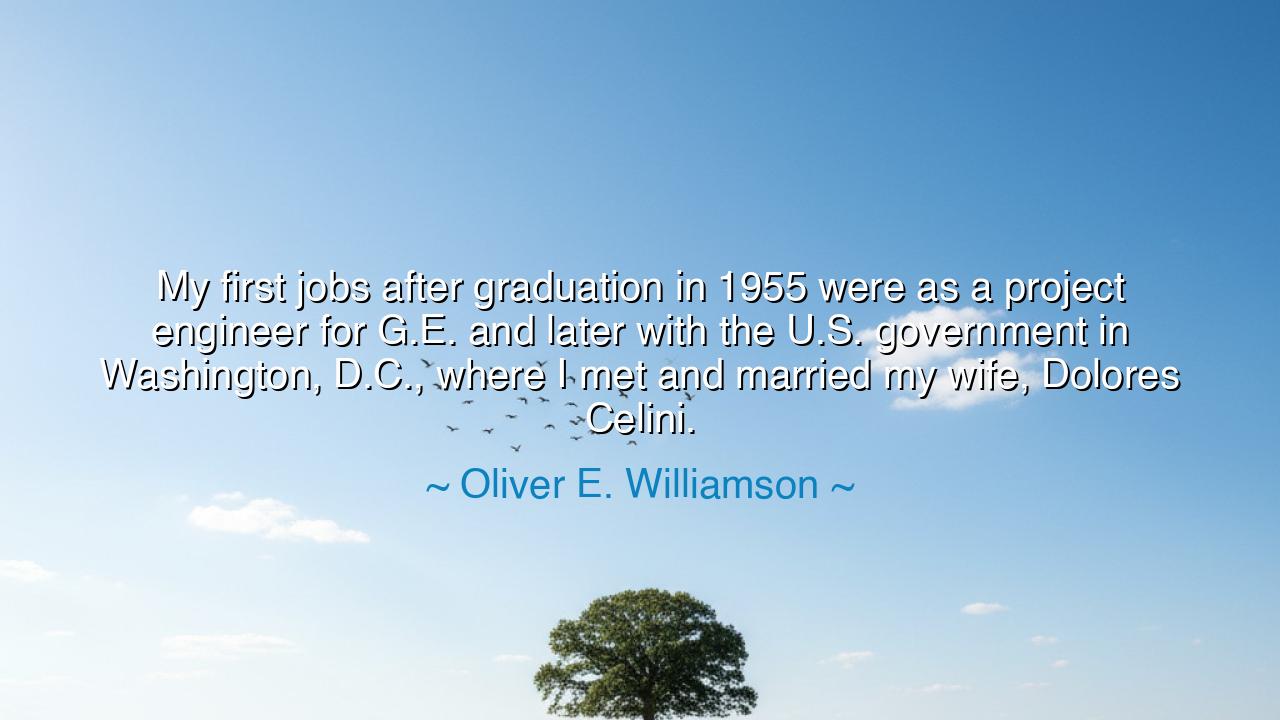
My first jobs after graduation in 1955 were as a project engineer
My first jobs after graduation in 1955 were as a project engineer for G.E. and later with the U.S. government in Washington, D.C., where I met and married my wife, Dolores Celini.






In the measured and dignified words, “My first jobs after graduation in 1955 were as a project engineer for G.E. and later with the U.S. government in Washington, D.C., where I met and married my wife, Dolores Celini,” Oliver E. Williamson offers a quiet reflection on the formative beginnings of both a career and a life. Beneath this simple recollection lies a deep truth — that the paths of labor, learning, and love are intertwined, each shaping the other into the architecture of a man’s destiny. His words speak not of grandeur or triumph, but of the sacred ordinariness that forges greatness: honest work, steady growth, and the companionship that gives all striving its meaning.
The origin of this quote comes from Williamson’s own journey as one of the most influential economists of the twentieth century. Long before he would receive the Nobel Prize in Economic Sciences in 2009, he was a young engineer, fresh from graduation, stepping into the world not with fame but with curiosity and diligence. In 1955, he joined General Electric, one of America’s great industrial pillars, where precision, systems, and structure shaped his early thinking. Later, his work with the U.S. government in Washington, D.C. exposed him to the machinery of policy and organization — the living laboratory where human decisions meet institutional design. It was there, amidst the corridors of bureaucracy and the hum of ambition, that he met Dolores Celini, who would become his lifelong companion — the emotional anchor to his intellectual voyage.
In this moment of remembrance, Williamson reveals something profound about the nature of beginnings. Every great life, he reminds us, starts not in glory but in apprenticeship — in the quiet labor of learning how the world works. Just as an engineer studies the integrity of a bridge, the young mind must learn to build the structures of thought that will carry it across the storms of life. Williamson’s early years taught him what all seekers of wisdom must one day learn: that before one can innovate, one must understand; before one can lead, one must serve; and before one can theorize, one must observe.
To the ancients, this progression — from novice to master — was the sacred rhythm of growth. The Greek philosopher Aristotle spoke of technē, the art of craft, as the foundation of all wisdom. He believed that understanding begins in practice — that the hand teaches the mind. In much the same way, Williamson’s years at G.E. and in government became the forge where his later theories on transaction costs and organizational economics were tempered. He saw how institutions functioned not as abstract models, but as living organisms, shaped by human limitation and trust. The lessons of his early labor became the seeds of his later genius.
Yet Williamson’s words also reveal the gentler side of the human story — that life’s greatest discoveries often come unannounced, hidden within the routines of work and duty. Amid the seriousness of his professional beginnings, he met Dolores, whose companionship transformed labor into joy and duty into destiny. The ancients would have called this eudaimonia — the harmony of purpose and love, intellect and heart. For what is success without someone to share its burdens and blessings? In meeting his wife, Williamson found the counterbalance to ambition — the warmth that steadies reason and gives meaning to every achievement.
His reflection is thus both humble and timeless. It reminds us that greatness is not born in sudden flashes of brilliance but through steady devotion — to one’s craft, one’s principles, and one’s relationships. The year 1955, for him, was not simply a date of employment, but a cornerstone of identity. The young engineer became a thinker, the thinker became a husband, and the husband became a teacher to generations. His journey is a testament that the most enduring legacies are built not in haste, but in patience and partnership.
The lesson, then, is twofold: first, that all mastery begins in small beginnings, and second, that all ambition must be tempered by love. Do not despise the days of modest work, nor the simplicity of ordinary life, for within them lie the materials of destiny. The early years of toil are the roots that sustain the tree when it finally bears fruit. And in the midst of that labor, if love finds you — as it found Williamson and Dolores — receive it as the noblest gift of all, for it will give your work its soul.
And the practical action is this: whatever stage of life you are in, honor your beginnings. Work faithfully where you stand, for each task shapes the person you are becoming. Seek wisdom not only in books, but in the discipline of your craft and the honesty of your relationships. Do not rush toward greatness — let it emerge naturally, as it did for Oliver E. Williamson, from years of learning, living, and loving well. For the truest measure of success is not in titles or awards, but in the quiet legacy of a life built with purpose, intellect, and heart — a life where even the humblest start becomes the foundation of something eternal.






AAdministratorAdministrator
Welcome, honored guests. Please leave a comment, we will respond soon